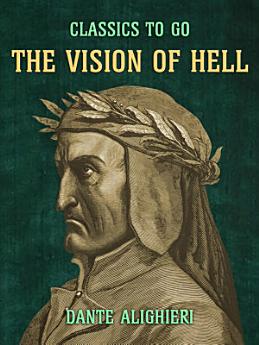The Vision of Hell
Mai 2022 · Otbebookpublishing
E-Book
188
Seiten
family_home
Zulässig
info
reportBewertungen und Rezensionen werden nicht geprüft Weitere Informationen
Über dieses E-Book
Inferno is the first part of Italian writer Dante Alighieri's 14th-century epic poem Divine Comedy. It is followed by Purgatorio and Paradiso. The Inferno describes Dante's journey through Hell, guided by the ancient Roman poet Virgil. In the poem, Hell is depicted as nine concentric circles of torment located within the Earth; it is the "realm ... of those who have rejected spiritual values by yielding to bestial appetites or violence, or by perverting their human intellect to fraud or malice against their fellowmen". As an allegory, the Divine Comedy represents the journey of the soul toward God, with the Inferno describing the recognition and rejection of sin.
Autoren-Profil
Dante Alighieri, born in 1265 in Florence, Italy, is a towering figure in world literature, renowned for his profound impact on the Italian language and his exploration of human nature, morality, and the afterlife. Dante's life was marked by political turbulence; he was deeply involved in the complex and often violent politics of Florence, aligning with the White Guelphs, a faction opposed to Papal influence. This political engagement led to his exile in 1302, a turning point that profoundly influenced his literary work.Dante's writings transcend mere storytelling, offering a rich tapestry of philosophical, theological, and ethical insights. His innovative use of the vernacular Italian rather than Latin made literature accessible to a broader audience, laying the groundwork for the Renaissance. His work is characterized by its intricate structure, vivid imagery, and profound allegorical depth, exploring themes of love, justice, and redemption.Controversially, Dante was unafraid to critique powerful figures of his time, including popes and political leaders, which earned him both admiration and enmity. His visionary ideas on the nature of sin, virtue, and the human soul have influenced countless writers, from Geoffrey Chaucer to T.S. Eliot, and continue to resonate today.Dante's legacy extends beyond literature; he is celebrated as a pioneer who bridged the medieval and modern worlds, offering a timeless reflection on the human condition. His life and work remain a testament to the enduring power of poetry and the written word to challenge, inspire, and transform society.
Dieses E-Book bewerten
Deine Meinung ist gefragt!
Informationen zum Lesen
Smartphones und Tablets
Nachdem du die Google Play Bücher App für Android und iPad/iPhone installiert hast, wird diese automatisch mit deinem Konto synchronisiert, sodass du auch unterwegs online und offline lesen kannst.
Laptops und Computer
Im Webbrowser auf deinem Computer kannst du dir Hörbucher anhören, die du bei Google Play gekauft hast.
E-Reader und andere Geräte
Wenn du Bücher auf E-Ink-Geräten lesen möchtest, beispielsweise auf einem Kobo eReader, lade eine Datei herunter und übertrage sie auf dein Gerät. Eine ausführliche Anleitung zum Übertragen der Dateien auf unterstützte E-Reader findest du in der Hilfe.







